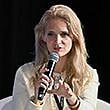Shattering glass ceilings: Women rising to the top in UAE businesses
This explores the rise of female leaders, their unique strengths, the future of business.

Women are increasingly claiming their rightful place at the top of the business world, shattering glass ceilings and demonstrating their leadership capabilities across a diverse range of industries. This surge is not just a societal shift, but a testament to the talent, resilience, and expertise women bring to the table.
Data paints a hopeful picture, but challenges remain. Statistics from a UN Women technical brief reveal that in G20 countries, just under 30 per cent of senior management positions are held by women. The UAE is a shining example, with women holding two-thirds of public sector jobs, including 30 per cent in leadership roles, according to the UAE embassy in Washington DC, US.
Noni Anand, co-founder of dynamic lifestyle hotel, Leva Hotels, in Dubai, talks about what it is like to be a businesswoman in a male-dominated field.
For me personally, being a woman in a male-dominated field is incredibly uplifting and encouraging. It gives me the opportunity to demonstrate my skills and highlight the capabilities of women

When asked about her views on equal opportunities she said, “It's gratifying to see that women today are receiving equal opportunities as men. Our voices and opinions are not only being heard but also acted upon. While it can be intimidating at first to be the only woman in a boardroom full of men, this initial discomfort fades. As you gain confidence in your contributions and stand firm in your beliefs, the focus shifts to the substance of the discussion.”

Resources and challenges for women in high-profile roles
Women in high-profile business roles, whether as CEOs or entrepreneurs, have access to several resources aimed at supporting their careers. Mentorship programmes, professional networks, and women-focused business organisations provide critical support.
However, challenges remain pervasive. Women often face gender bias and discrimination, which can manifest as unequal pay, limited access to funding, and fewer opportunities for advancement.
Sadek shares some of her personal experiences about challenges she faced saying, “The most obvious resource challenge that women face in business today is access to money. For example, StuDIYo lab is a business that I have fully funded to date. Since its inception in 2019 and despite the huge challenges Covid-19 threw at me, I have managed to grow it into two centres (Dubai and Abu Dhabi) and a wonderful business partnership with the government of Sharjah, creating for them a unique enrichment centre for children from the ages of 6 to 12 years, where our woodworking program is one of the offerings. Despite all this, if I was to consider funding through a bank, I can see that this will not be as straight forward as I would have thought. I am not sure how much value is attached to the belief and unwavering support that a founder like me gives to her business, for a bank.”
Sara Chemmaa, CEO and founder of UAE-based Citron, raised an interesting opinion about the main challenge facing women entrepreneurs.
It might sound controversial, but unfortunately the answer is often ‘us’. We need to make sure we aren’t held back by any type of gender bias, whether that is real or perceived. Women need to be confident in their ability to bring value to any table and that they belong there just as much as anyone else.

She emphasised that women should not be the ones standing in the face of their own success.
To succeed in leadership roles, women must navigate and bridge divides, including differing opinions and gender biases. One effective strategy is fostering open communication and collaboration. By building inclusive teams and encouraging diverse viewpoints, women leaders can create environments where innovation thrives and conflicts are resolved constructively.
Mentorship and allyship are also crucial. Women can benefit from seeking mentors who provide guidance and support while also serving as mentors to others, creating a cycle of empowerment. Building alliances with male colleagues who advocate for gender equality can further help bridge divides and promote a more inclusive workplace culture.
Collaboration instead of competition
Collaboration instead of competition is a point that was also addressed by Maral Nouri, chief operating officer of a Dubai-based public relations agency, Luna PR - a company specialising in strategic communications for clients in the web3, crypto, fintech, blockchain, and emerging technology industries.

The lack of representation in executive roles can also lead to isolation and a lack of role models. Work-life balance is another significant challenge, as societal expectations still often place the bulk of domestic responsibilities on women.
A question that is often raised and remains controversial: Is there a specific field or area of expertise that women excel in?
According to studies and statistics, certain sectors have seen a notable influx of women excelling and leading the way. The healthcare, education, and non-profit sectors are particularly prominent. However, excelling in certain fields doesn’t necessarily mean that women are better, it could be the result of the higher number of women in those particular fields, which will naturally lead to biased results.
When Anand was asked this question, she said, “In my view, success knows no gender boundaries, and women can excel in any path they choose, just like men. Today, there are several fields where women have particularly excelled. In areas requiring talent, such as sports, various dance forms, painting, and sculpting, women have consistently proven their mettle. The fields of creativity and communication are increasingly female-dominated, including advertising, design, photography, and production. Conversely, the banking, finance, and hospitality sectors may still have fewer women, especially in top positions, but I am optimistic that this is changing. Women are rapidly filling roles in these traditionally male-dominated industries, and their numbers are likely to increase in the coming years. Women excel in managerial positions because they embody a perfect balance of empathy and intellect, a combination essential for running any business successfully.”
Experiencing and overcoming imposter syndrome
Imposter syndrome, the feeling of self-doubt and inadequacy despite evident success, is a common experience among high-achieving women. Many women in leadership roles report feeling like impostors at some point in their careers. For example, Fabi Saad, a female entrepreneur and founder of global tech platform Positive Women, shared her experience of constantly doubting her capabilities despite her proven track record of success. “At the beginning of my career, I felt like an imposter with feelings of self-doubt and inadequacy. Personal development, deep introspection, learning from mistakes and reflection helped me overcome the syndrome. I once had the opportunity to meet Oprah Winfrey who told me a powerful phrase that has stayed with me ever since.
"I don't have imposter syndrome. If I'm in that room, it's because I deserve to be there. I earned it!” said Saad to Gulf News.
Laetitia Berthet, chief operating officer of Lake (LAK3), a company dedicated to transforming the global water economy through blockchain technology, talked about methods to support women to overcome effects of the imposter syndrome and help in fitting in stereotyped male-dominated positions.
While significant improvements have been made, there is still a long way to go. Over the past 10 years, I've witnessed the web2 field evolve. I've experienced various supportive initiatives in the companies I've worked for, such as promoting female role models, offering visibility and influence opportunities, discussion groups on leadership skills, mentorship programs offering valuable inputs and support, and even coaching classes. Nowadays, there are plenty of channels to create strong networks that empower women to take their deserved place

The evolution of women in the business world is a journey marked by remarkable achievements and ongoing challenges. Women have made significant strides in various industries, demonstrating that they excel in leadership roles and bring invaluable benefits to organisations. However, barriers such as unconscious bias, work-life balance, and networking gaps continue to impede their progress.

She went on to explain how she navigated this and was able to turn the situation in her favour. “This resulted in a sense of insecurity, where I didn’t feel like I belonged. I used this to fuel my work, fuel my ‘inner fire’, making it about pugnacity and outcome. Today, I can proudly say I am where I am because of my consistency, dedication and unwillingness to take no as a final answer. Close the door, but keep an eye on the open window; that's where I come in.”
By leveraging available resources, fostering inclusive environments, and addressing imposter syndrome, women can continue to advance and thrive in the business world. The path to gender equality in leadership is ongoing, but with continued effort and support, the future looks promising for women in business.
Sign up for the Daily Briefing
Get the latest news and updates straight to your inbox



